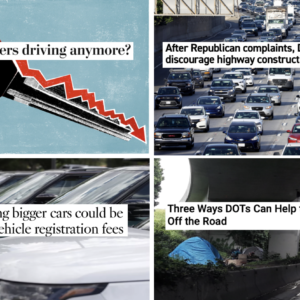
(Photo: Jaime Pérez)
Here are the bike-related links from around the world that caught our eyes this week:
Bike migration: Refugees from Syria, Iraq and Afghanistan are arriving in Storskog, Norway, 250 miles north of the Arctic Circle, by biking across the border from Russia.
Ghost bikes: Grist traces the history of the memorial tradition to St. Louis.
Bridge history: “I know every crack, every bump, every little ridge on her,” says a Hawthorne Bridge commuter who took up biking as part of her fight to escape anorexia and built deep personal connections to the span. “I just wish the sidewalks were wider.”
Engineer excuses: “Recovering engineer” Charles Marohn has a list of five ways traffic engineers deflect criticism.
Street philosophy: There are basically two ways to think about streets, engineer Simon Valee writes: the engineering approach and the economic approach.
Bridge tolls: The chair of NYC’s transportation committee has endorsed the Move New York plan to toll bridges for subway funding.
#CrashNotAccident campaign: “‘Accident’ is not neutral,” writes Hsi-Pei Liso, whose three-year-old daughter was killed by a person who failed to check the crosswalk before a left turn. “It implies a lack of guilt. Yet reporters often use the word in news stories before crash investigations are complete.”
Chief Bicycle Officer: Atlanta has hired one: Becky Katz.
Self-owning cars: Shared autonomous vehicles could theoretically be set up as tiny rolling corporations that gradually pay off “birth loans” to the factories that build them.
Manufacturer risk: Volvo has joined Mercedes and Google in accepting full liability for collisions from its driverless cars.
Lowrider bikes: L.A. activist General Dogon uses his artsy freak bikes to organize Skid Row residents for protests.
Advertisement
Cars and community: “With Seattle’s small Black community now so dispersed, ‘automobility’ is essentially a requirement,” writes Seattle Bus Chick Carla Saulter in a short piece on how cars sometimes strengthen community even as they perpetuate the problems they solve.
50-lane jam: Wider highways would definitely relieve congestion. Right?
Pavement cost: “Stormwater runoff from urban roadways is so toxic to coho salmon that it can kill adult fish in as little as 2½ hours.”
Weed for streets: Unconventional Vancouver city council candidate Justin Forsman says he can preserve the city’s crumbling streets with $800,000 in annual marijuana taxes.
Density myth: There’s no such thing as a city that has run out of room, writes Emily Badger. Especially in the States.
Housing and inequality: New homes in Portland are aiming above the middle class because the middle-class population is barely growing, a state economist says.
London beats Amsterdam: The British capital bikes more than any other city … as long as your only data set is people who use Strava.
If you come across a noteworthy bicycle story, send it in via email, Tweet @bikeportland, or whatever else and we’ll consider adding it to next Monday’s roundup.
Correction 2:20 pm: An earlier version of this post inaccurately described Charles Marohn’s professional history.







Thanks for reading.
BikePortland has served this community with independent community journalism since 2005. We rely on subscriptions from readers like you to survive. Your financial support is vital in keeping this valuable resource alive and well.
Please subscribe today to strengthen and expand our work.
That Emily Badger piece in the Washington Post is predictably awful.
“from an economist’s point of view, there is no such thing as a full place”
She has obviously not talked to the wise sage Herman Daly* (an economist), or to anyone who understands limits (who exist in just about any discipline).
“Put more people in a city, and the economy grows.”
Right. Breezy journalist, thy name is myopia.
*http://steadystate.org/wp-content/uploads/Daly_SciAmerican_FullWorldEconomics%281%29.pdf
Everything we know about cities suggests that, in fact, quality of life doesn’t go down as more people crowd in — the opposite happens. Denser populations support not just more amenities…
I very much enjoyed living in Madrid, Spain. Maybe the economists Emily quotes have a point.
We are (and this is probably not surprising) talking about two different things, soren.
You and Emily Badger (and many others) are talking about how fun it is to live in dense (Western) cities; the pleasures that combinations of density/history/architecture/cuisine/etc. afford. I am not quibbling with that.
I am saying something else, something Herman Daly says better. We no longer live in the Empty World that (most) economists imagine. The central premise of a limitless store of resources which our frontier mentality (and Neoclassical Economists) have kept alive no longer pertains; is obsolete; is a dangerous obfuscation of the degree to which we now live in a Full World. Economic Growth and More People do not magically or inexorably make the kinds of resources we all rely on: food, water, air, shelter, etc. appear. The way we’ve gotten as far as we have is to drawn down the stocks of fish, fresh water, top soil, clean air, fossil fuels. We are not and haven’t for generations been living on the interest but are drawing down the principal.
Daly and the Limits to Growth crowd might be correct, I’ll grant that, but their neo-Malthusian paradigm is a very difficult political sell; it very often reads, like Emily Badger suggested, as “I’ve got mine, now get out.” I think the paradigm also has the tendency to lead to fortification along class lines — on the neighborhood level right now, but also in the potential future on a global scale, as countries wall off themselves from refugees of climate crises they have largely created.
I personally believe that yes, there could be a physical extreme on the limits of growth on the cosmological level — but right here, right now, on earth? Any calls of resource scarcity are political choices about distribution of resources, not necessarily of availability.
“their neo-Malthusian paradigm is a very difficult political sell”
So… we should smear honey in each others’ ears, because to speak the truth is just too painful?
Neo-malthusianism is still an ideology (I’m not saying it is without some merits), and defendants of it need to give good answers to the distribution question for it to have any traction, IMO. Otherwise, it easily becomes a libertarian “I’ve got mine” world. There is a good reason that in an era of focus on tough social justice questions, limits to growth proponents are losing ground, even with the folks that are their most likely political allies.
“Neo-malthusianism is still an ideology ”
🙂
“defendants of it need to give good answers to the distribution question for it to have any traction”
I’m always for a spirited debate, but I see no one (including you) giving very good answers for how our reigning ideology: Economic Growth addresses the question of distribution, is any more plausible than some alternatives.
My response to how distribution will or should be handled in a future of vastly fewer resources is bound up with the view that distributing the finite quantities of goodies we have will invariably be more fraught the more people we are trying to feed, house, clothe, educate, keep healthy, etc. So to me this conversation is putting the cart before the horse. Inequality is an enormous problem now but it cannot but become more of a problem as the ratio of goodies to mouths declines, as it must in a finite world with a growing population.
You wrote earlier: “Any calls of resource scarcity are political choices about distribution of resources, not necessarily of availability.”
While I think I know where you are coming from, acknowledging the inches of top soil we’ve lost, the disappearance of fisheries around the world, the burning of the easy to get fossil fuels & minerals, the clearcutting of forests, the falling groundwater tables, along with the hundreds of other metrics by which we can calculate our overshoot… these are biophysical facts that are observable, measurable regardless of our political leanings. Politics do come in when we are talking about distribution, so if I’m reading you correctly I would say that it is exactly the opposite: Without coming to terms with the physical resources we have to work with we can’t possibly make any reasonable, much less just decisions about distribution. Relying reflexively on Economic Growth to always bail us out, make the pie higher, is a surefire road to disappointment all around.
[Very nearly off-topic here — sorry everyone! I will stop w/ this post.]
Thanks for your thoughts, and absolutely, all terrible & untenable things, no disagreement there! My critique is not in any way an endorsement of business-as-usual.
I think what is interesting re: limits to growth is that its “proof” is always “around the corner.” (Again, this is not to say it it is not “true,” or that it won’t happen.) It’s just never been “proven” — which is why we have “neo-” Malthusianism, and why we’ll probably have another iteration of it in a couple decades.
Intellectually, I also think the declensionist narrative of limits — i.e., “everything will collapse” — precludes the possibility of meaningful political progress, of crafting a world somewhere between the excesses of capital and the pits of societal collapse. I honestly do think the reality of the next century will be much more composite, much more in-between. I think it will test the “limits,” as it were, of our compassion for others, and I think that starts by being very clear about the need to allow more people to partake of the benefits of contemporary urban life. American cities have traditionally done a very poor job of this, ours included. The neighborhood zoning battles happening here are a small vision of the fighting for the “right to exclude others” that is surely to come.
I think I also find it challenging to take seriously first-worlders/people from the global north who talk about the “reality of limits” without acknowledging that the problem at stake in the here and now (meaning concern for those alive now rather than future generations) is primarily one of distribution — that they and their ancestors “used up” far more resources than most individuals in the global south. Given that this “using up” has already mostly happened according to the limits folks, people in the global north have a moral obligation, IMO, to in some way equitably share the rest. That’s my sorta marxist thinking here.
“Given that this ‘using up’ has already mostly happened according to the limits folks, people in the global north have a moral obligation, IMO, to in some way equitably share the rest.”
We agree!
🙂
I’ll be honest and say that there are some days when I’m a little bit of a Malthusian too…
Thanks for your thoughts.
“right to exclude others”
vs.
“Iron Law of Accommodation”
Perhaps we could talk more about these two. I feel like our conversations are impoverished for glossing over these in-built but largely unremarked notions. One of the wonderful things about these kinds of public conversations is that concepts like these emerge, rise to the surface. Sometimes it is difficult to have the conversation if we can’t pinpoint or name points of disagreement or points of view.
at first glance it appears badger and daly may be talking about two different things. mindless growth may be stressing the ecosphere, but that in itself does not imply that you cannot get economic efficiencies by increasing the density of urban center.
That is very astute. My quibble with Badger, though, is her breezy dismissal of any limits. Her eagerness to focus *only* on the scale of the metro areas elides the dynamic (bio-)physical conditions that make life in cities possible. This is untenable. We need to hold our journalists and opinion makers to a (much) higher standard.
I’m sure Emily Badger, like many of us, also lives in a big city, where everything we could possible want magically appears on grocery shelves and on our porches, or is piped in and our of our centrally heated houses through wires or pipes. She pays the bill and it just keeps on like this month after month, year after year. What could possibly interfere with this?
“how many bbls or oil, how many tons of CO2, how many fish, how many inches of topsoil,”
My contribution to not kicking the can down the road is to not eat fish, share a small apartment, and minimize my CO2e production.
Nevertheless, my city can also make an important contribution to “not kicking the can” by promoting density and active/public transport.
“How is it going to be easier to wrestle with population limits, resource limits, etc. with eight billion people than with six billion?”
Almost all this growth is occurring in the developing world so I give to PSI:
http://www.psi.org/health-area/contraception/#about
In 2013 we provided 22,404,426 CYPs and prevented an estimated 5.6 million unintended pregnancies and more than 15,400 maternal deaths.
(1 CYP=1 couple year of pregnancy protection.)
I too have my household-level strategies that I like to think are salutary. But when we talk here about growth and density we do not for the most part talk about individual frugality but about public policy hemmed in as it is by our cultural antipathy to acknowledging limits.
Perhaps you can explain to me, then, how you reconcile your private understanding of limits with your public embrace of Emily Badger’s view of the unlimits of cities? I suspect you might agree that, ceteris paribus, eight billion sorens will use 33% more resources than six billion sorens. If you do, then what is gained (in a Full World) by parroting the nonsense that Emily Badger is sending into the world? Why do the limits you seem to acknowledge in the private realm of your household consumption not symmetrically applicable outside the walls of your apartment, in the realm of public policy and the kinds of growth Emily Badger crows about?
i could be very much mistaken, but i understood badger’s piece to be an argument that detroit or portland does have sufficient physical capacity to accept [x] additional people — from, shall we say, existing stock. in other words, i did not understand her to say breed all you want, we have infinite resources. various forms of the word “growth” do appear in her essay, but they seem to refer to moving existing people into a defined space.
the question where are we going to get the clean water or the electricity she implicitly answers, if you have [x] people already you have to find the water and electricity somewhere, and it is more efficient to deliver this stuff to a more densely populated center than to scattered shacks in the hinterlands.
“detroit or portland does have sufficient physical capacity to accept [x] additional people”
Fair enough. Though eliding the questions of (a) whether this growth is as you say, from existing stock or not, (b) what it takes, physically, to accommodate additional thousands or millions, and (c) the whole idea of biophysical limits to me adds up to an unhelpfully lopsided, if also very predictable perspective that just happens to dovetail neatly with the Growth-Soaked policies we’re already so familiar with.
In short, I stand by my critique. We are unlikely to make inroads into this set of thorny problems with more articles like Ms. Badgers.
And facile side-by-side charts with blue dots indicating divergent urban densities around the world as a way to suggest that all of us have orders of magnitude of slack before we pull even with Hong Kong, or whatever, is disingenuous, and misunderstands (again) how cities are not factories-with-assured-input-streams, but complex, historically evolved, and in-our-present-moment highly precarious arrangements whose dependence on fossil fuel drenched supply networks is largely out of sight.
as much as I want to read more cityobservatory.org articles the huge font and text the same color as the background but a little darker make it too annoying… if I really want to read it I’ll copy/paste it into a word processor…
Try “Reader View” if you use Firefox. It’s a little icon on the right side of the address in the address bar. Cleans up many of the worst news sites.
I like the Clearly and Readability extensions for Chrome. Agree completely that City Observatory’s site design is bizarrely indifferent to accessibility issues.
In addition to the other comments, hold ctrl and scrolling the mouse wheel will rescale the webpage for that tab/window. The orange on orange is still bad, but this helps with the scale.
I enjoyed the Emily Badger piece and agree with many of the ideas she puts in the article. I, for one, welcome higher density living in PDX and cringe when I hear people say they want things to stay the way they are.
Badger’s point, backed-up by reality, is that’s not possible and no amount of rhetoric will change the fact. Our cities are constantly changing and we can either adapt to the needs of the times, or end up like Detroit.
What is not possible is exponential growth on a finite planet.
What is not possible is exponential growth on a finite planet.
And this is why we should support density! Urbanization is associated with decreased population growth and energy conservation.
I disagree.
Density, like energy efficiency, is a ratio; it tells us nothing about—in fact draws attention away from—the real issue which is limits: hard caps on what we can afford to do. Focusing as we do on these ratios instead of on the question of how many people, how many bbls or oil, how many tons of CO2, how many fish, how many inches of topsoil, allows us to engage in no end of wishful thinking.
Density is a means to an end, but without specifying the end, facing the dissonant music of limits, our embrace of this only serves to kick the can down the road, make the inevitable reckoning that much more difficult. How is it going to be easier to wrestle with population limits, resource limits, etc. with eight billion people than with six billion?
Forced sterilization?
So helpful. Thanks.
A nice big world war would also help.
got any more constructive suggestions up your sleeve?
Legalized assisted suicide, on the other end of the cycle.
http://www.theguardian.com/commentisfree/2014/sep/02/limits-to-growth-was-right-new-research-shows-were-nearing-collapse
On a different topic, Charles Marohn is a civil engineer, although to some extent disowned by his profession: http://www.strongtowns.org/journal/2015/2/3/can-you-be-an-engineer-and-speak-out-for-reform
Engineers could be likened to the bouncer at a whorehouse–they know what’s going on but their job depends on not blowing the whistle.
You’re right! I’ll edit.
Honolulu as an urban US city is probably as close to having the “density” and “growth limit” given the limited land on such an island ….event the open/green spaces have a role: the need to collect local rainwater (the mountainous green spaces in the center) and the attempt to grow food locally or to land tourists.
As an aside, I guess they could free up some land…start building the city underneath the international airport (or better would be to build the airport on top of new city in Ewa etc …to avoid damaging the fresh water “lense” and stay out of the plume of WW2 av gas / lubricants) or as an artificial floating island out at sea. (But “solutions” always seem to create new problems…its a growth industry of sorts.)
The BP description “Non-engineer Charles Marohn” is not correct. He is a licenced professional engineer. See the end of the linked article.
The “Housing and Inequality” article is absolutely correct. In fact, my wife and I have given up on Portland and are looking for jobs in Salem (where there are still homes for the non-wealthy)
Until one fears the graybar hotel for acts done behind the wheel as they are behind a gun, needless thousands will die and be maimed.
Word is getting around that there are few consequences for killing or injuring on the road.
As much as people love to run with the line “look at the crazy things they do in China!”, that “50-lane jam” is actually just a lot of toll-booths to a four-lane highway. And it’s the end of a holiday weekend, and they decided to add another disruptive checkpoint downstream…
Re the London/etc Strava commute data, the validity of it as a representative dataset is weakened by the fact that the “average” ride commute across the dozen featured cities ranged between 15-30km (~10-20 miles). Most travel survey data worldwide will tell you that average cycle commuting distances are MUCH less than that (typically more like 5-10km). So clearly Strava is mostly capturing the more keen riders (e.g. the “lycra” crowd) who are more likely to use Strava for monitoring their rides anyway…
This is a good point. I just opened Bicycling magazine and a reader asked about posting commutes to Strava. The answer they gave was basically, if you’re not interested in the metrics while you’re commuting, don’t bother. But this answer doesn’t account for 1) the routes and speeds then bias towards fitness rides, and 2) Strava is trying to create meaningful commute data (not biased by fitness rides) to help communities plan – it’s part of their business model.
In my opinion, if Strava is successful at getting cities to buy into using them as a source of viable planning data, it’ll be incumbent on commuters to ‘register their vote’ by tracking their commutes (with security zones around their endpoints). There’s been a lot of Strava-bashing on these comments in the past, but from my perspective, it’s about the best we’ve got to hope for in other cities that don’t perform bike counts (other than on BTW Day to qualify for their bronze statuses… ;).
Have you suggested anything?
I have, or have tried to over the past year here in conversations about this subject. I can’t seem to make the new search function work very well but we’ve had several extensive backs and forths about this here in the comments.